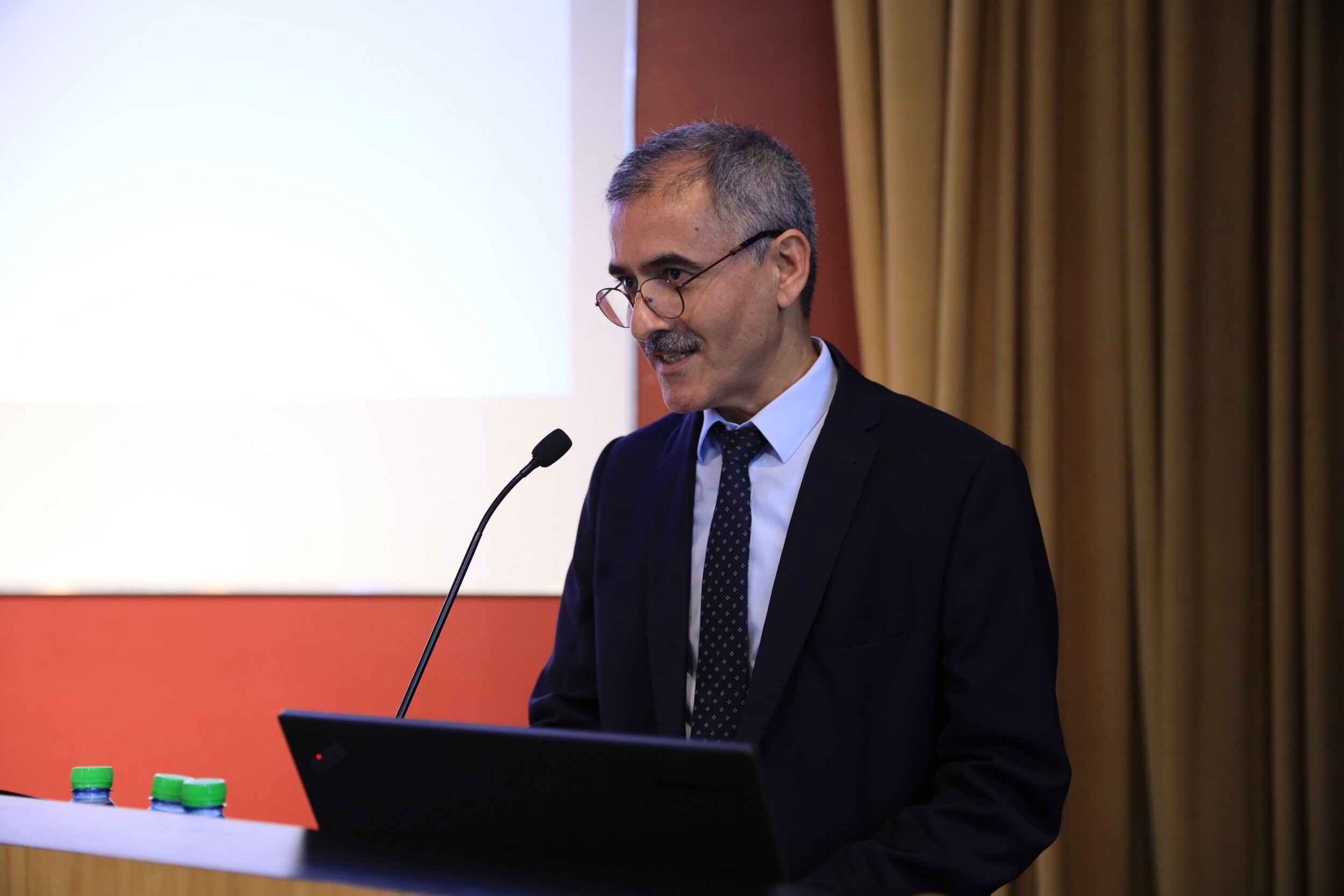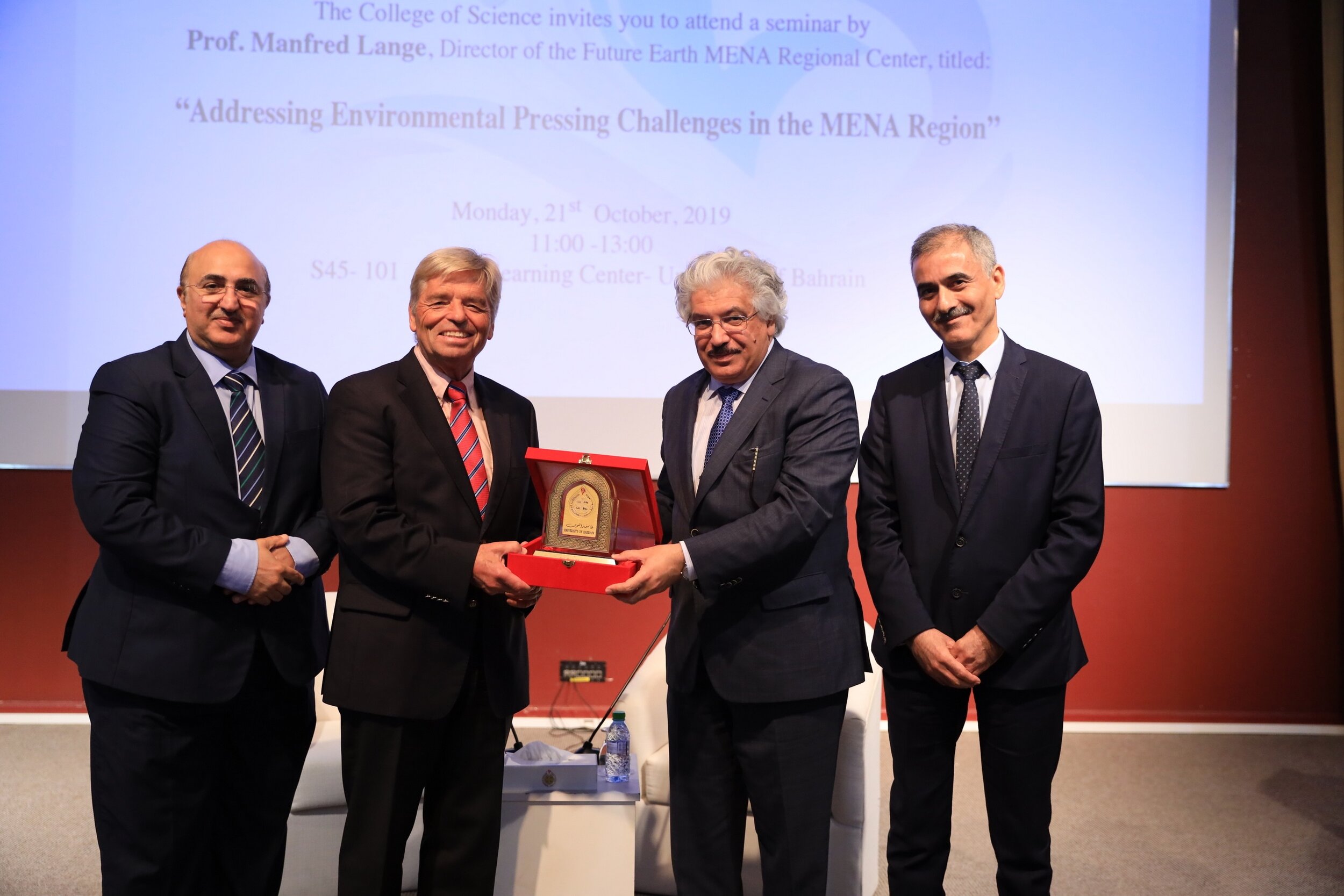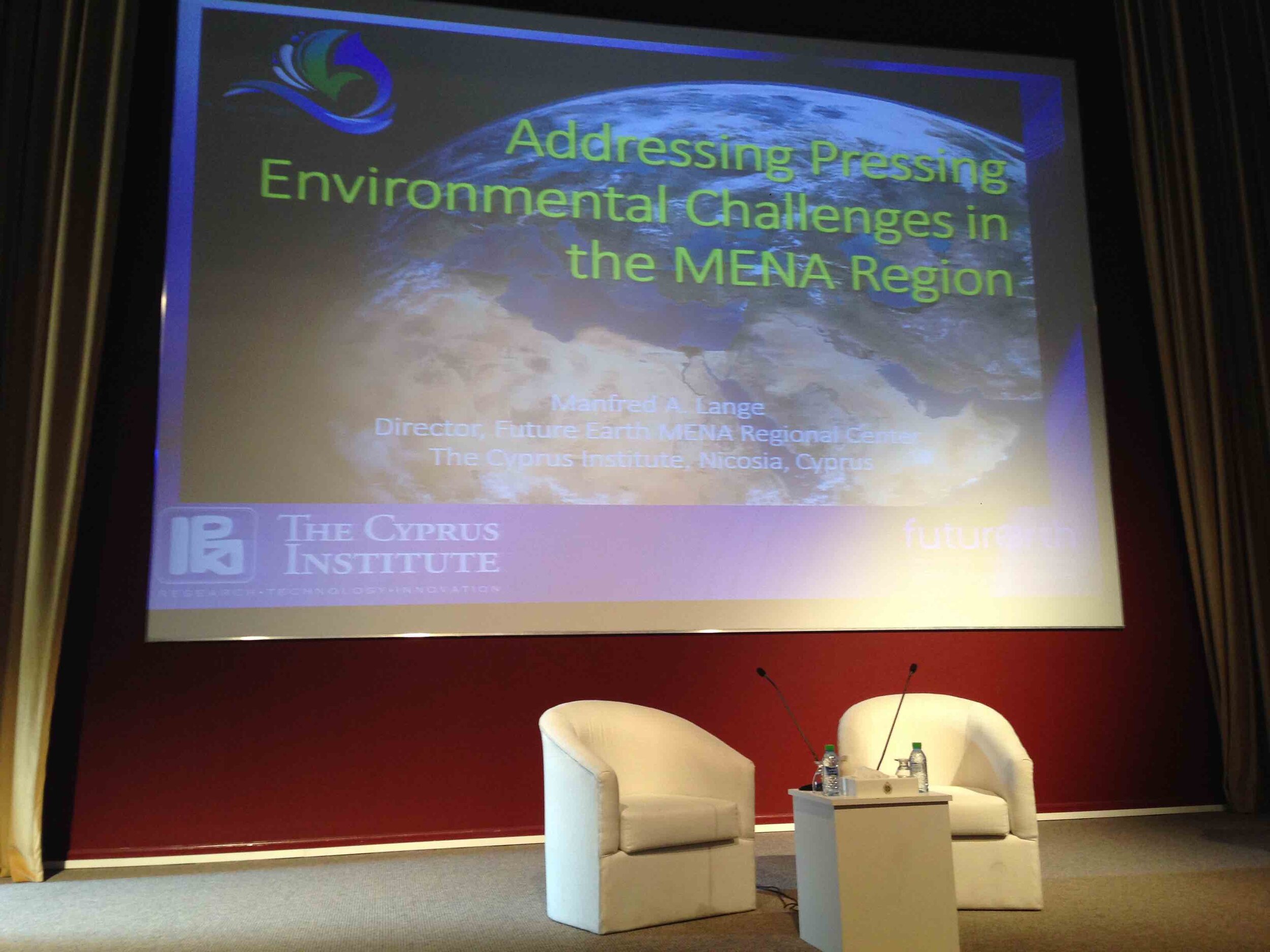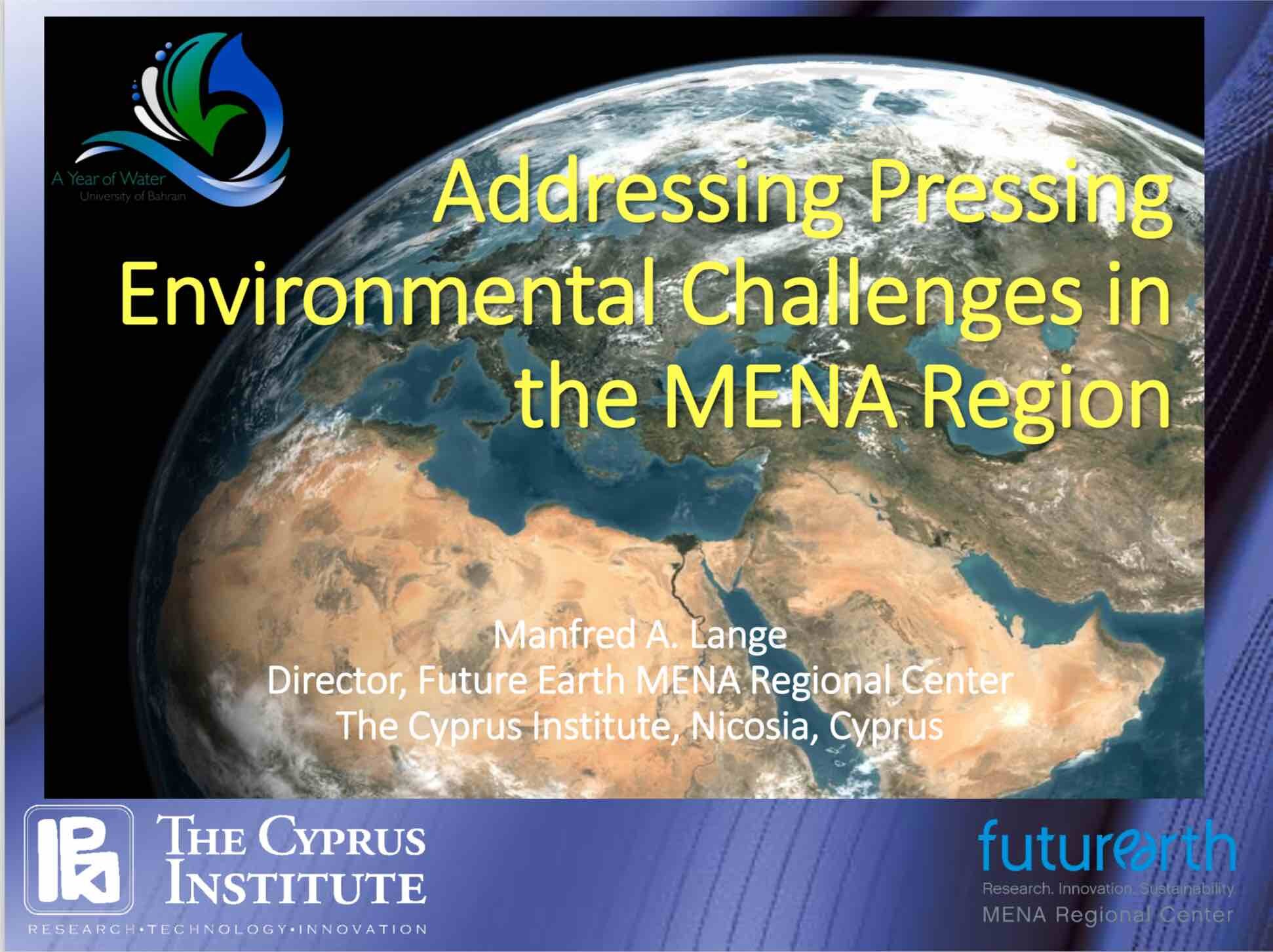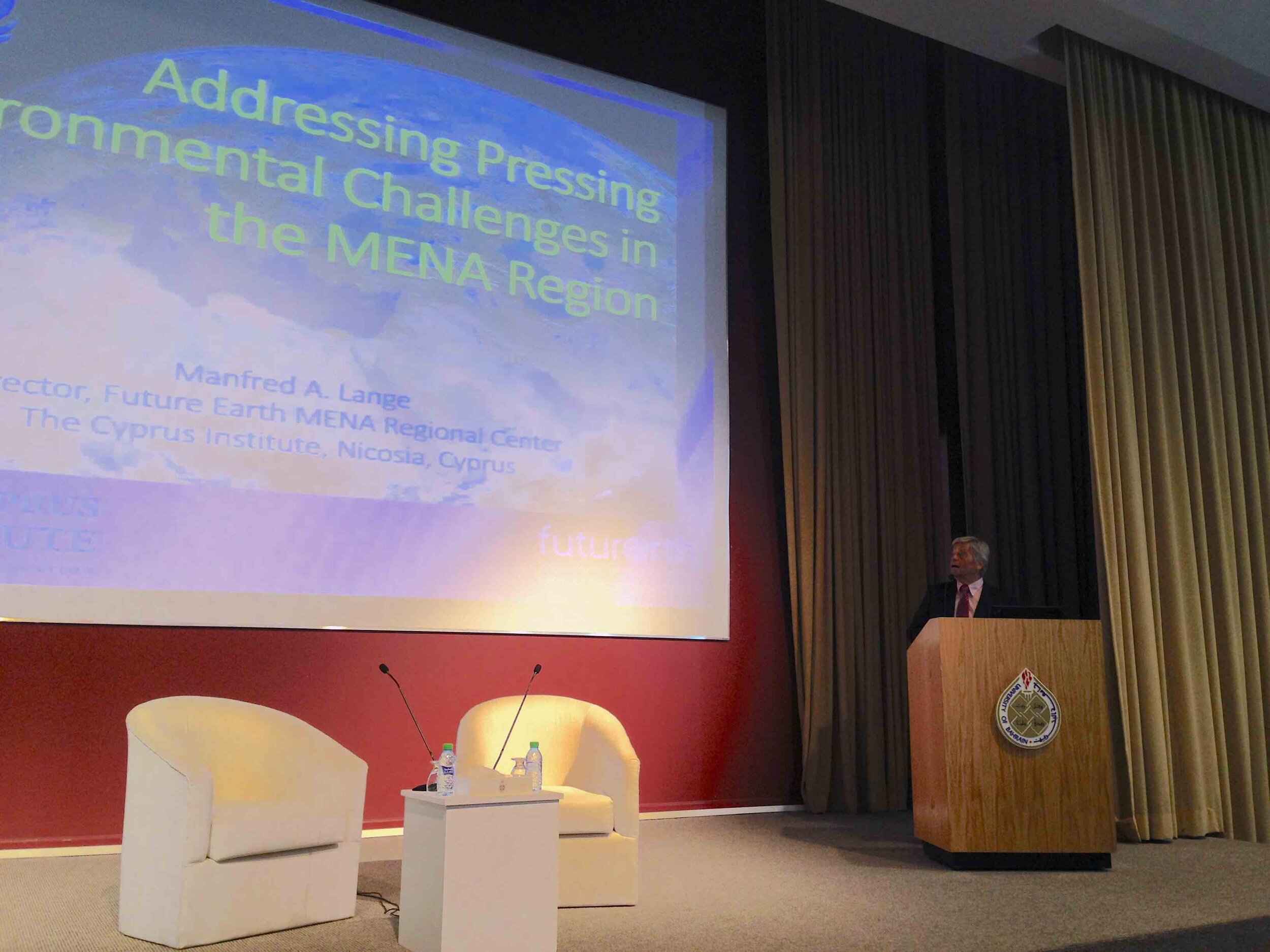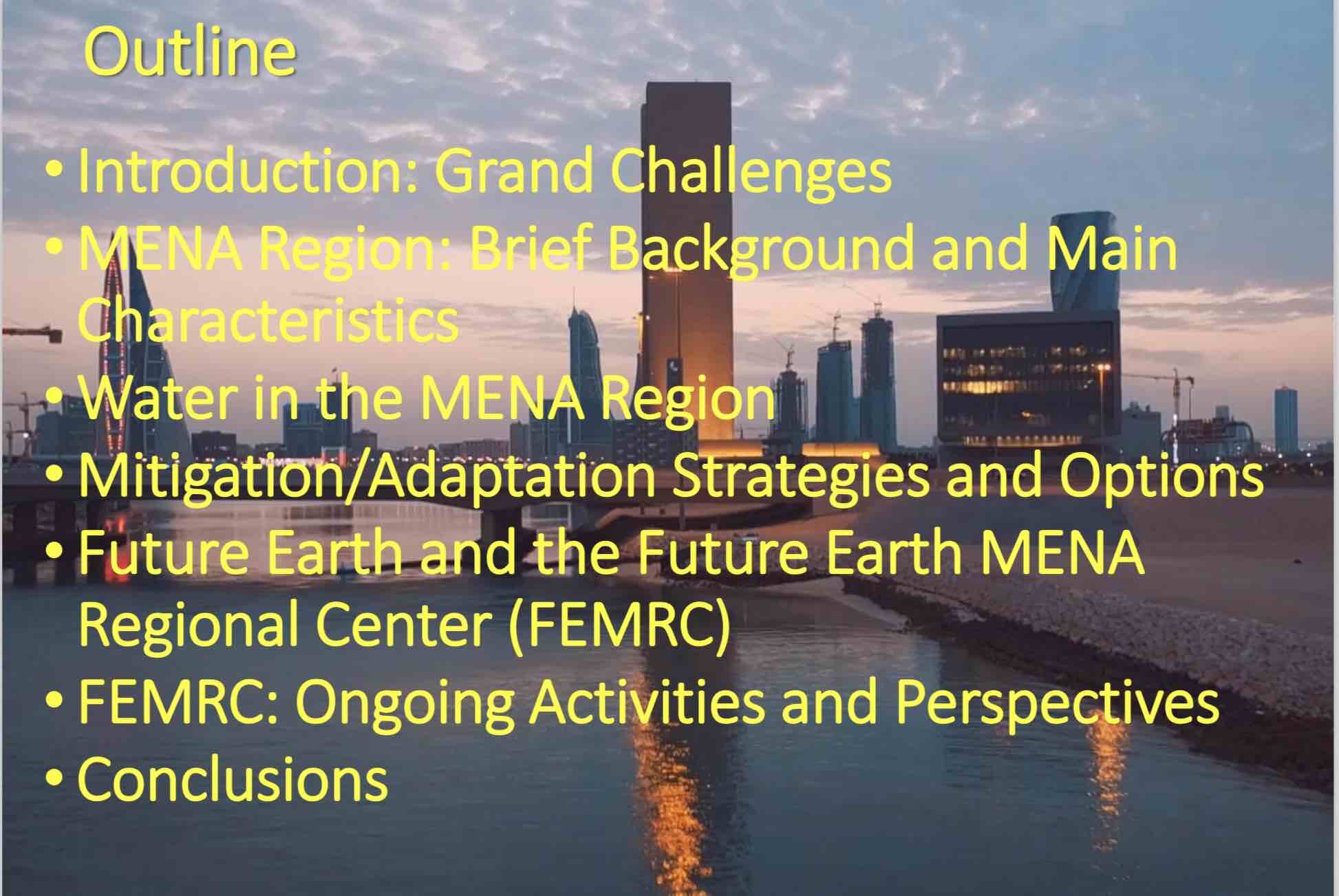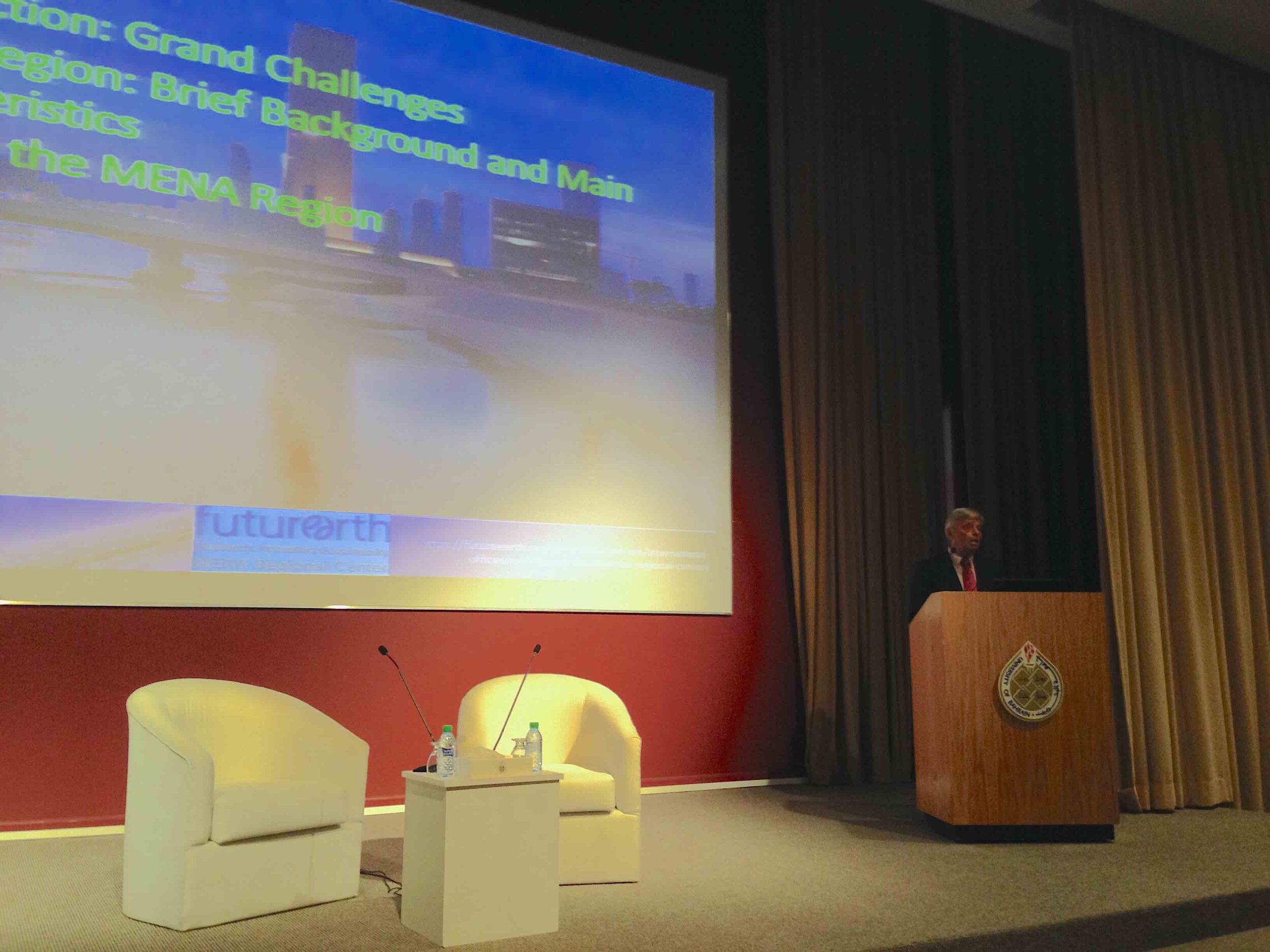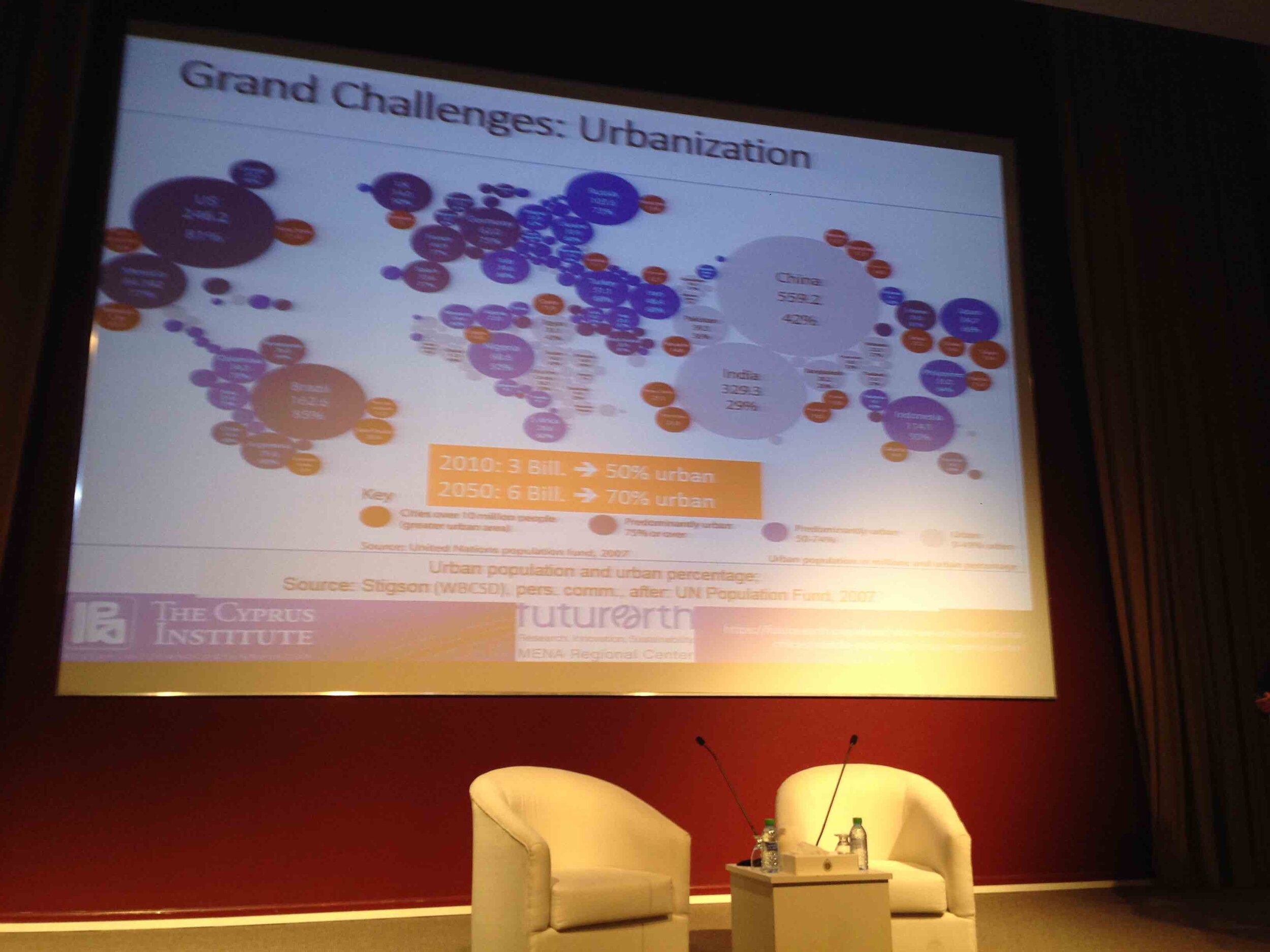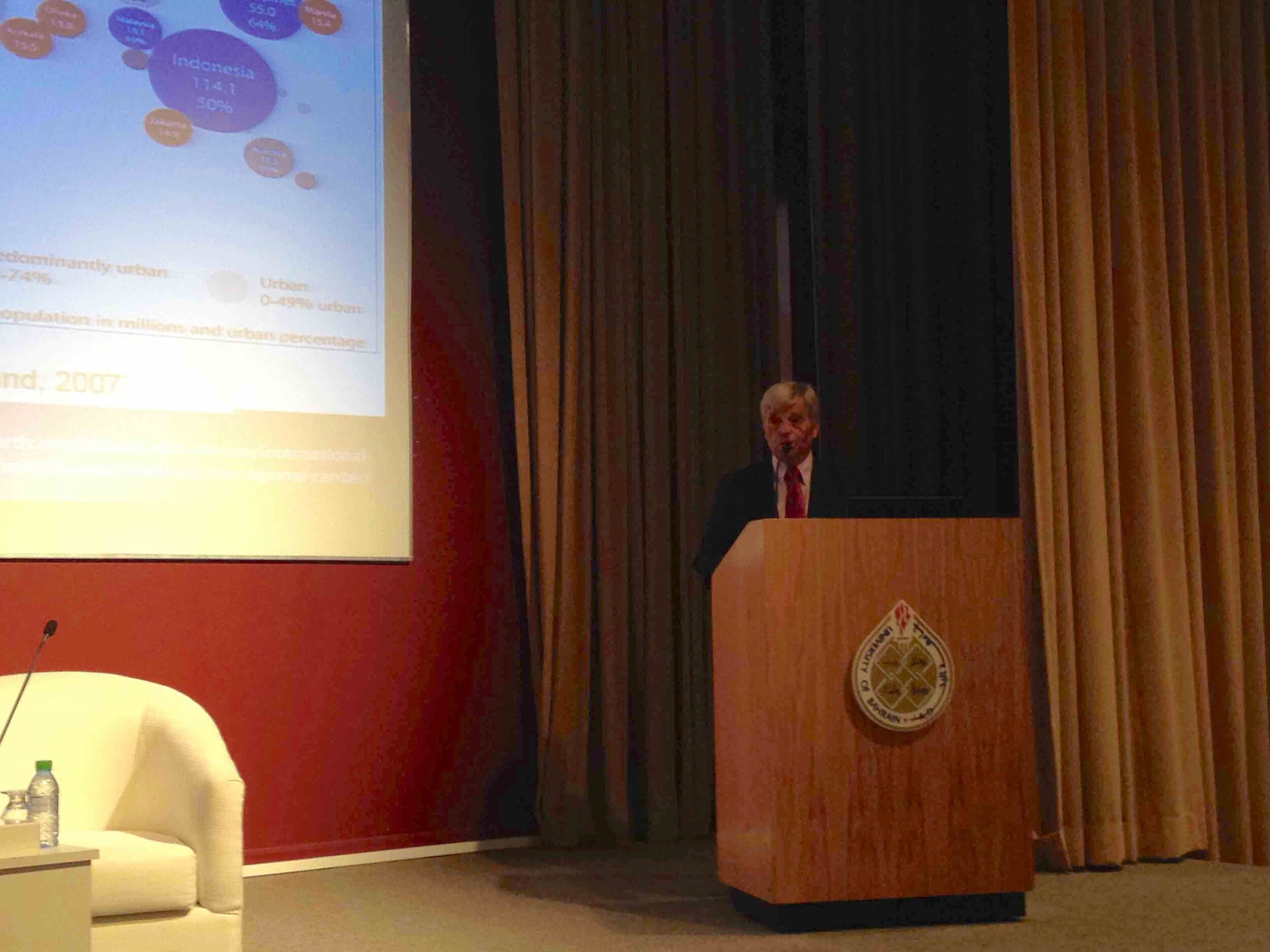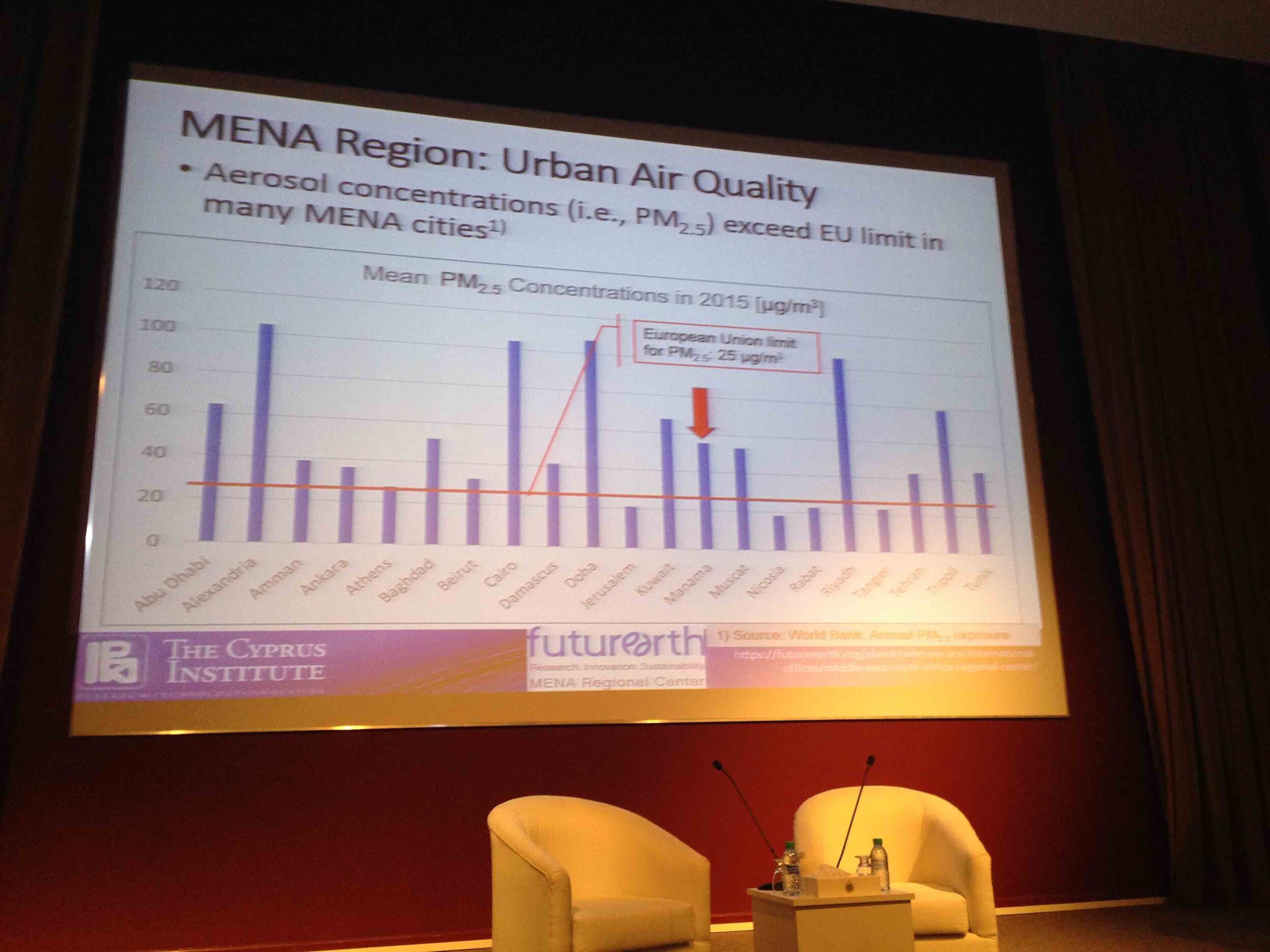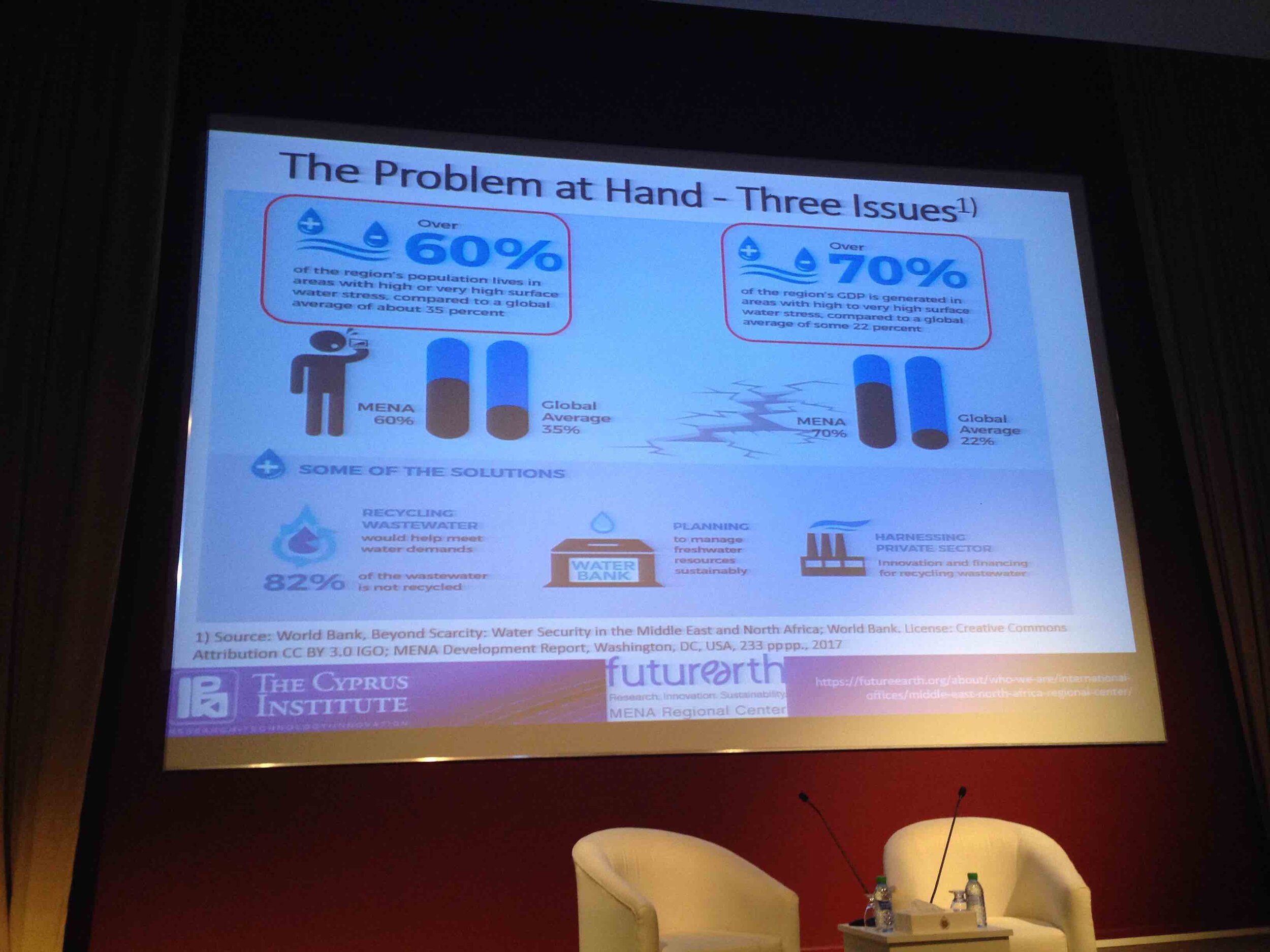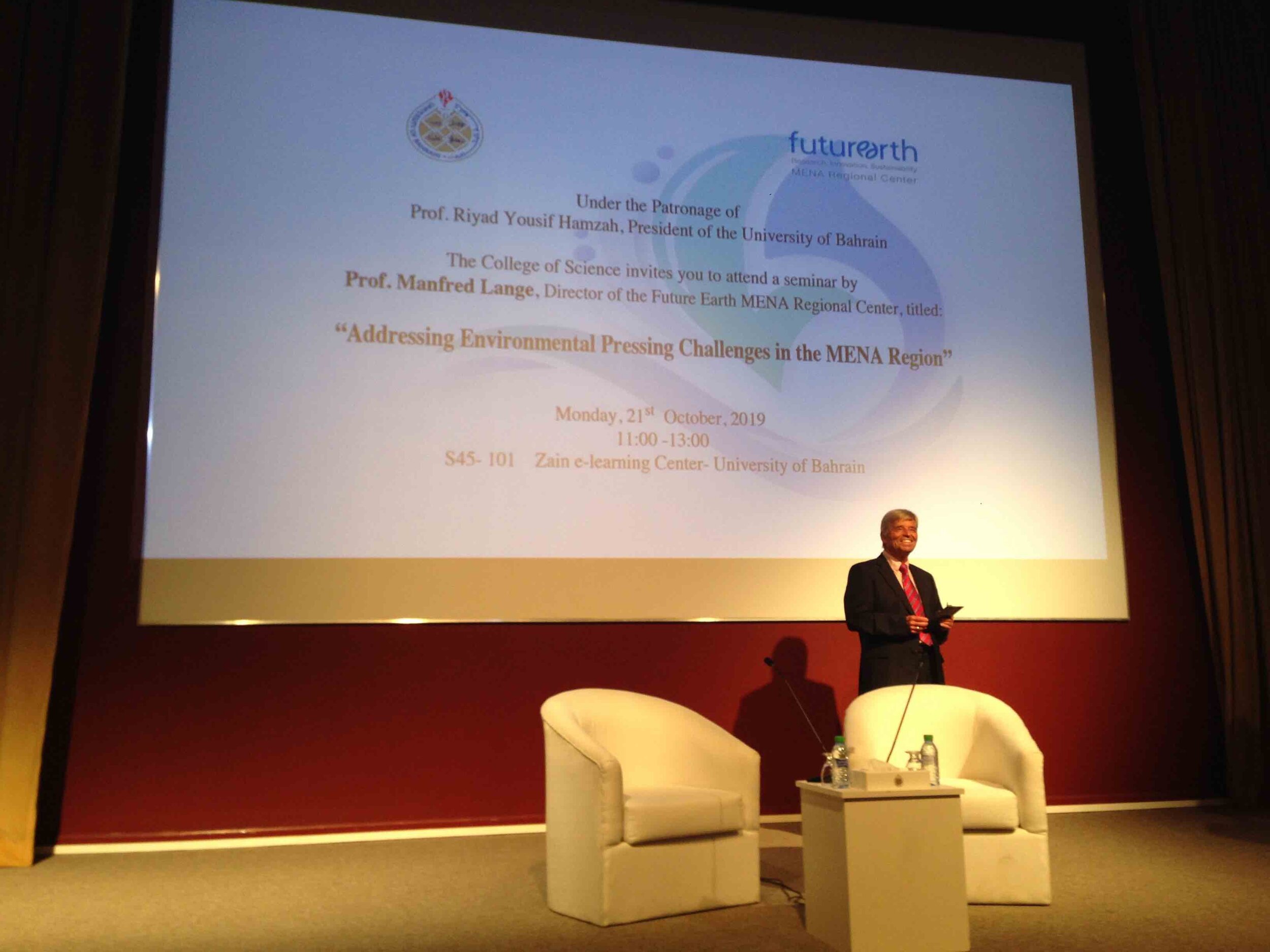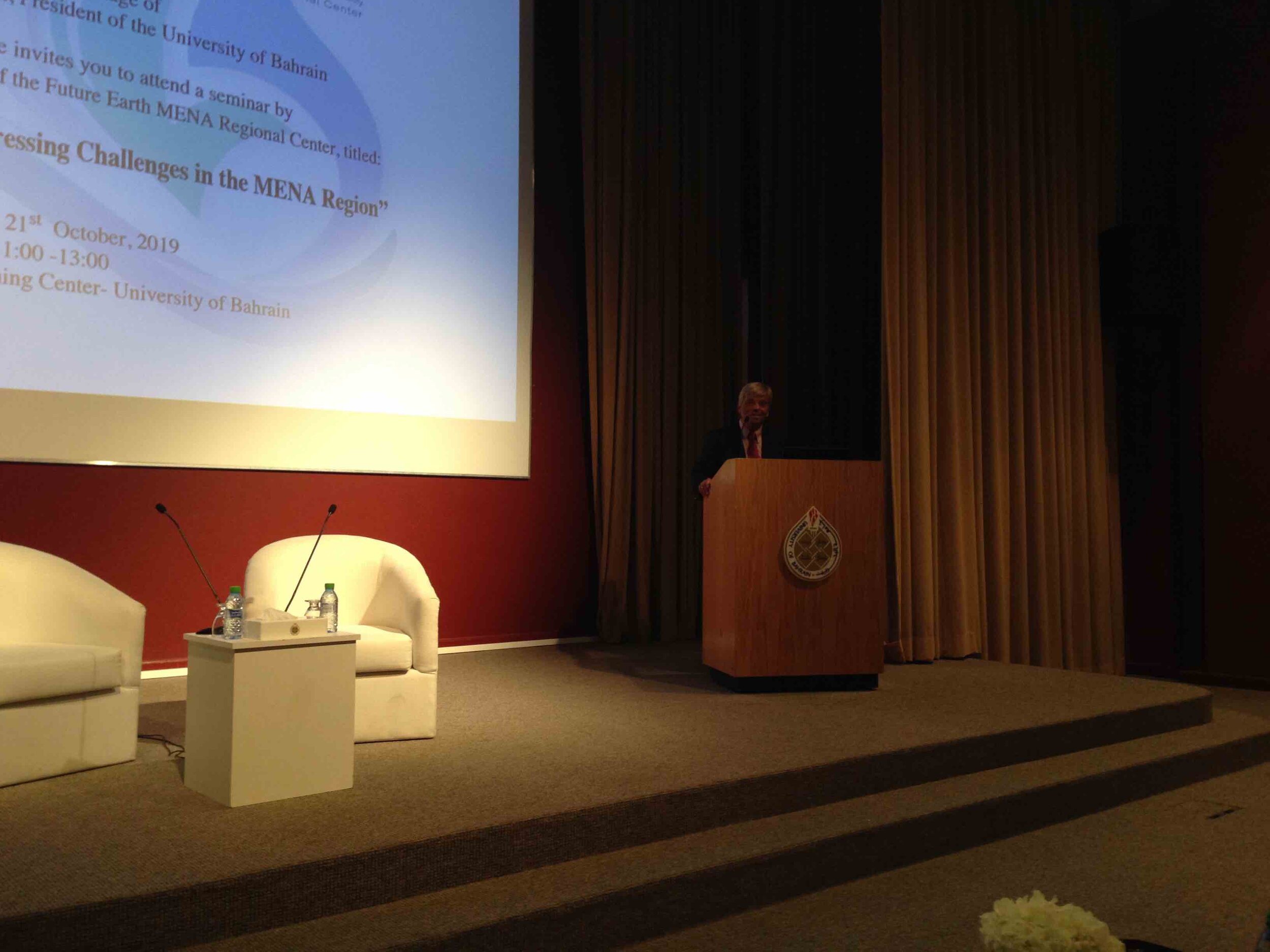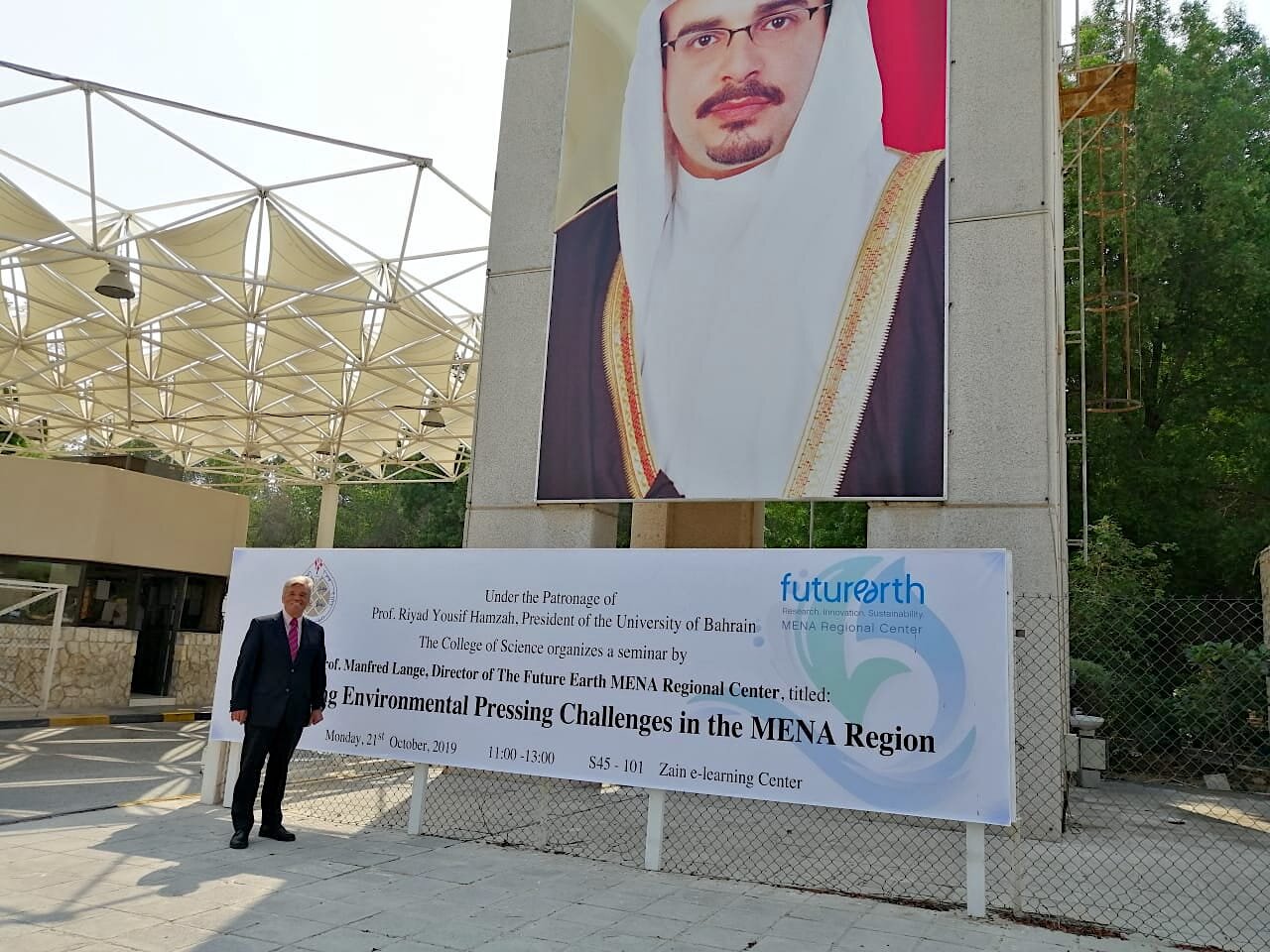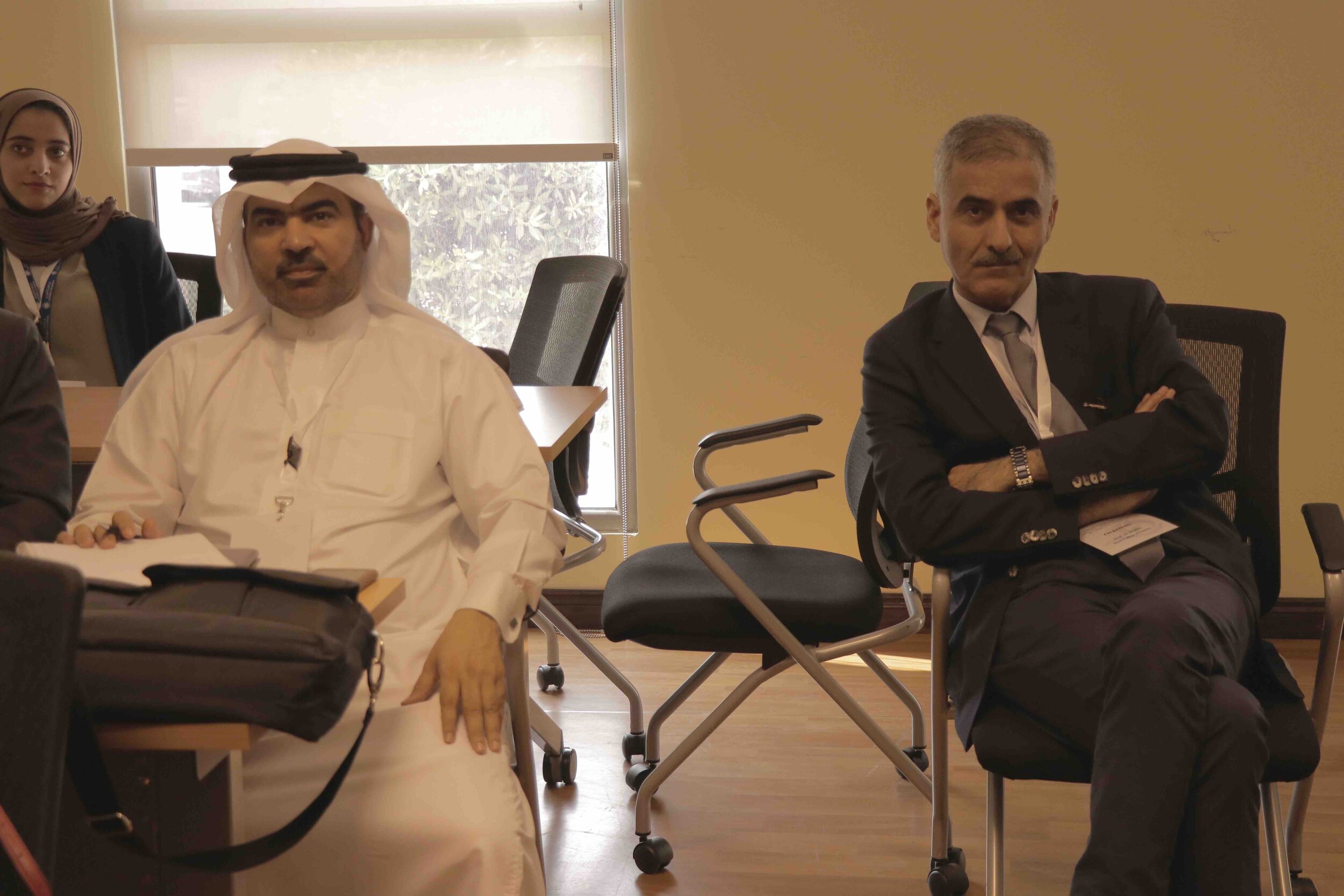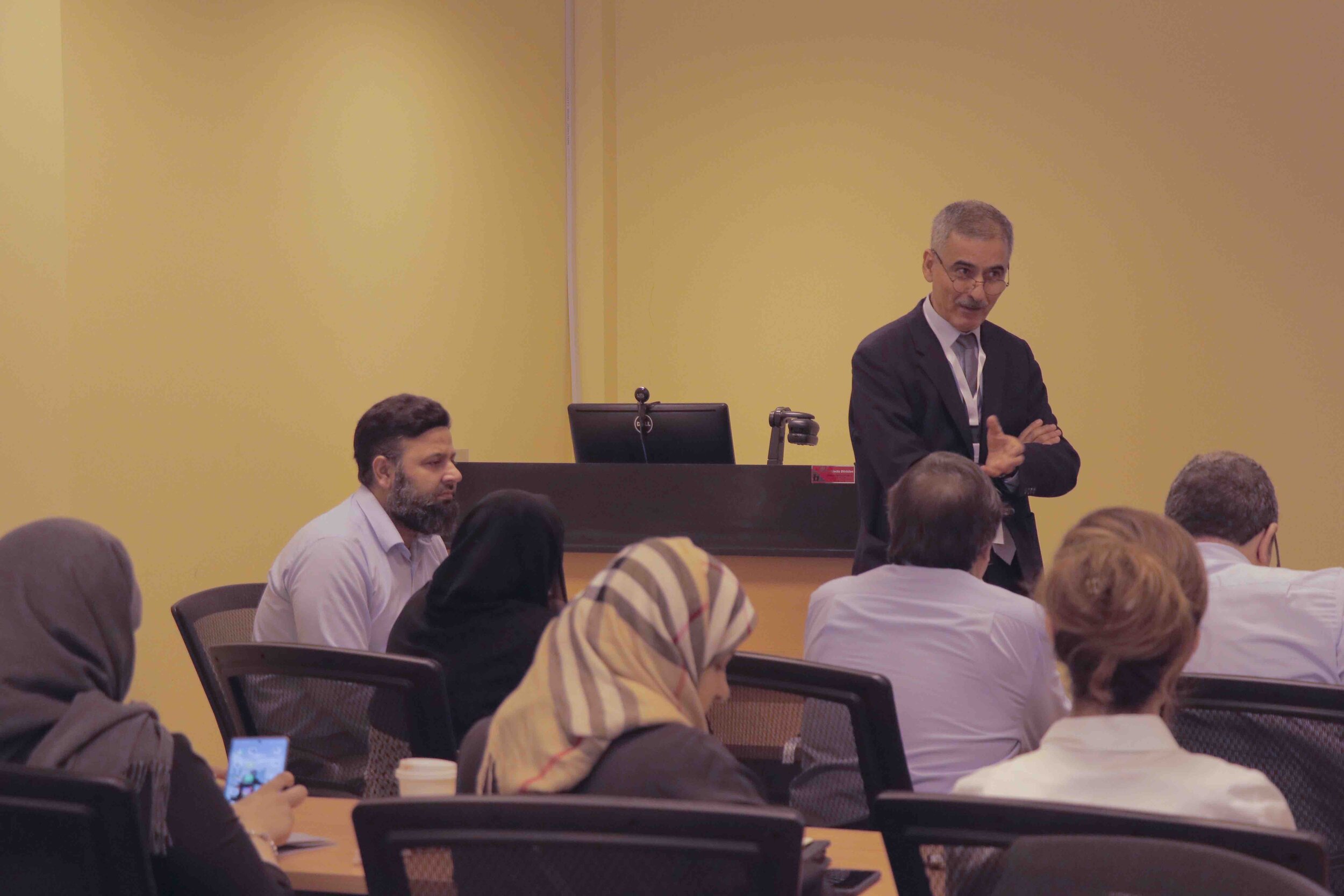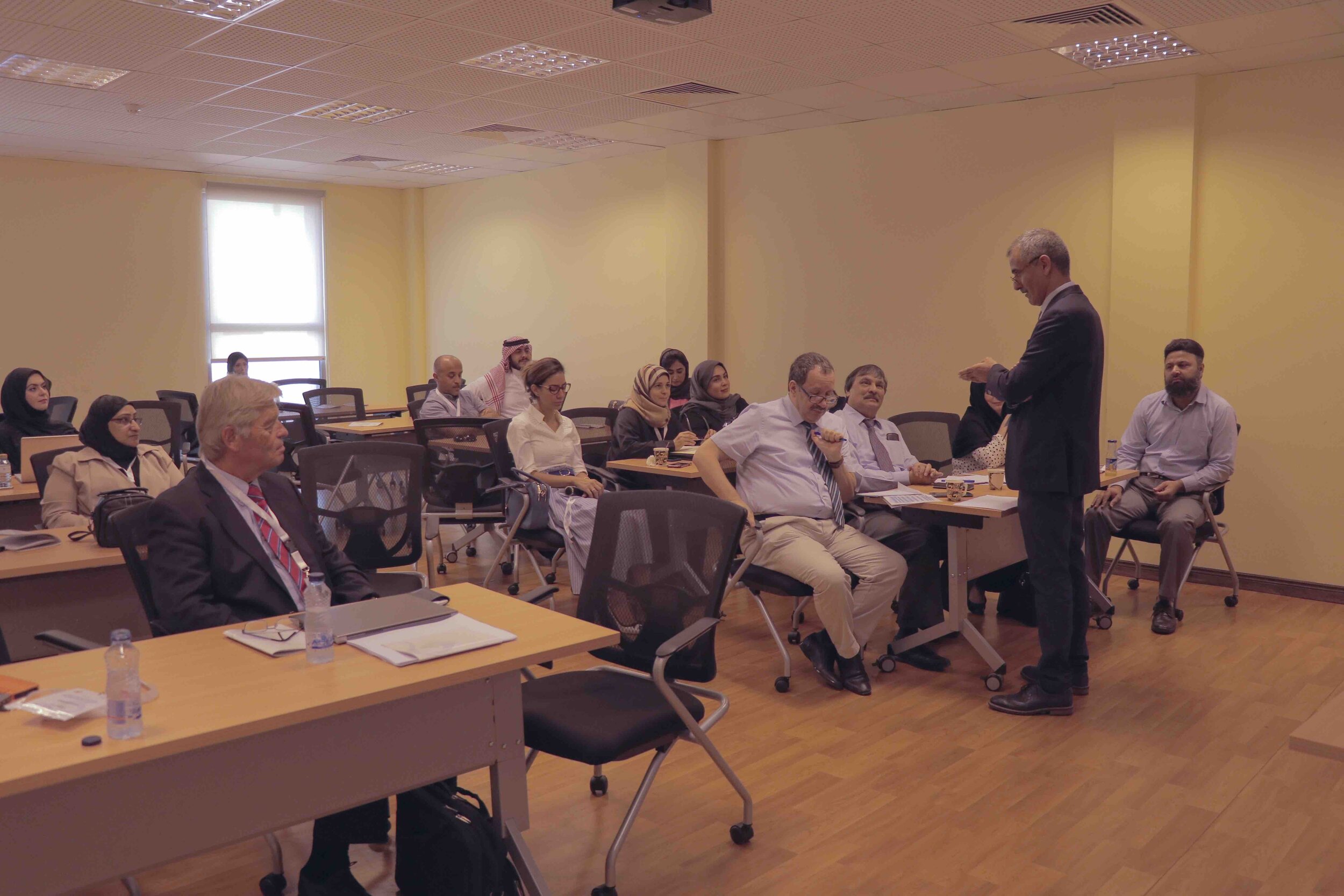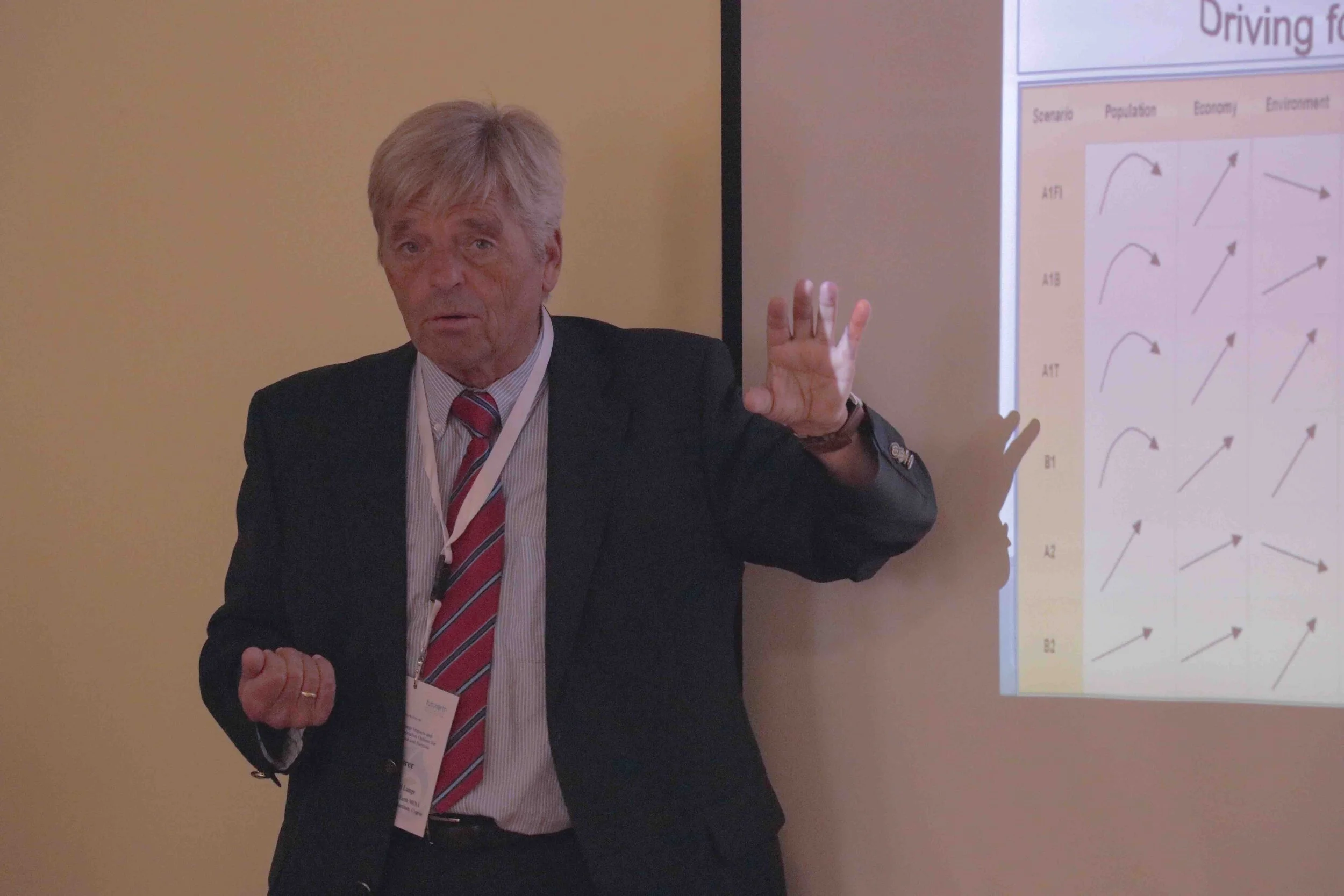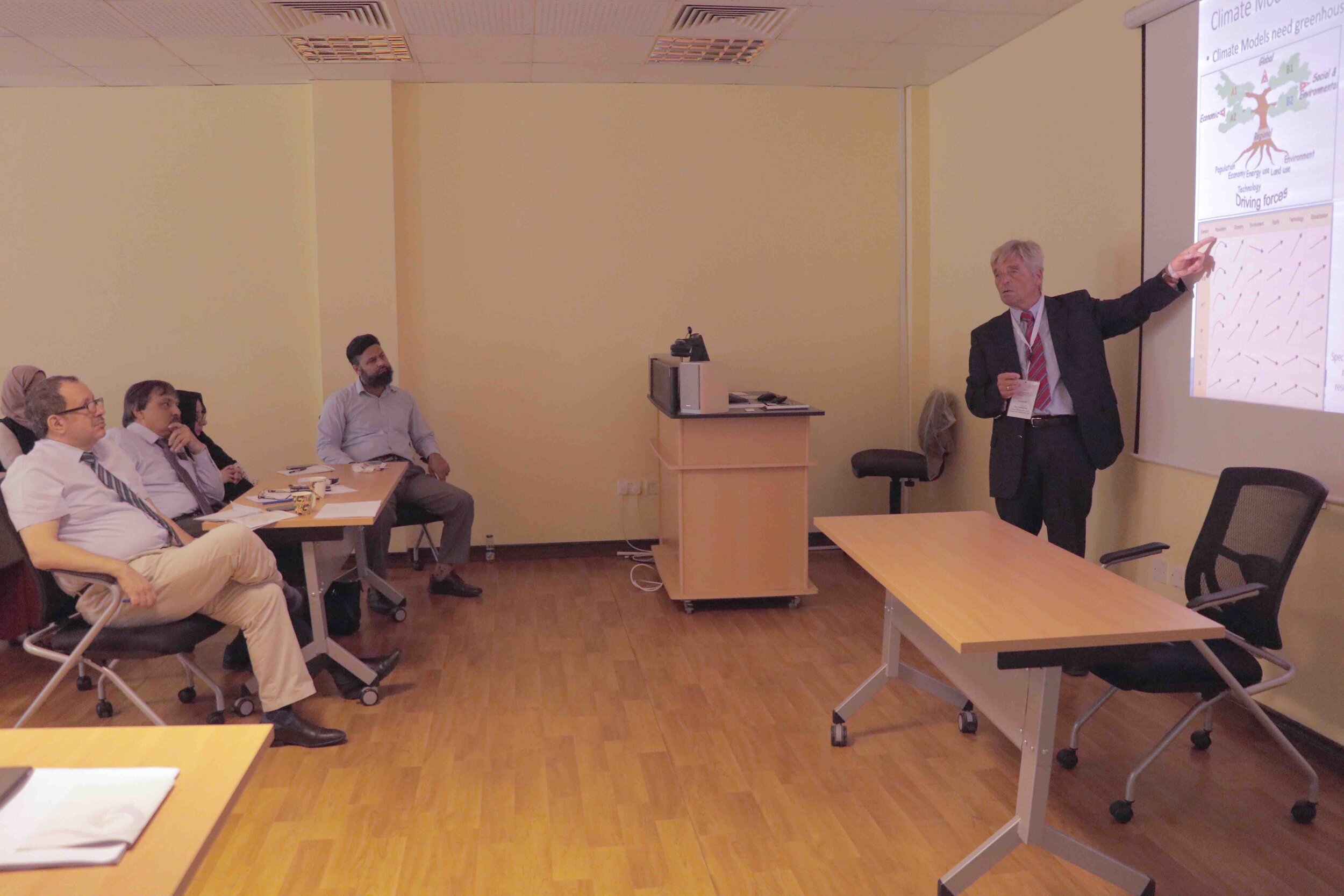21 - 24 October 2019
Environment & Sustainable Development Week
Events held on-site at the University of Bahrain, as part of the
“Year of Water” Program
Visit by Prof. Manfred A. Lange, Director, Future Earth MENA Regional Center (FEMRC)
Prof. Manfred A. Lange, Director of the Future Earth MENA (Middle East and North Africa) Regional Center which is hosted by The Cyprus Institute in Nicosia, Cyprus was invited by the University of Bahrain be part of the “Environment and Sustainable Development Week” organized at the College of Science. During this week, Prof. Lange presented a Seminar for the University and the general public that addressed pressing challenges in the MENA Region, and a specialized full-day Workshop for the enrolled PhD students of the Environment and Sustainability Program entitled, “Global Changes and their Impact: New Approaches for Mitigation/Adaptation Strategies to Advance Sustainable Development in Bahrain and the MENA Region”. This collaboration with MENA Center aims to tackle SDG 13 through dialogue, sharing best practice and comparative approaches.
SEMINAR
The Kingdom of Bahrain - the island nation comprised of a small archipelago made up of 40 natural islands and an additional 51 artificial islands, and centered around Bahrain Island - is part of Future Earth MENA network, which is represented in the Future Earth MENA Regional Center at the Cyprus Institute (FEMRC).
The President of the University of Bahrain, Prof. Riyad Y. Hamzah, is the chair of the Regional Advisory Committee of the FEMRC and Melina Nicolaides is an Advisory Board member and working with the UoB to develop the ongoing ‘Year of Water’ Program and the joint UoB-FEMRC Conference, “Water in the MENA Region: Preparing for a Changing World”.
As the University of Bahrain is a leading academic institution in Bahrain, paving the way to a modern, innovative and sustainable future for the Kingdom, FEMRC Director, Prof. Manfred A. Lange’s visit to the University to introduce Future Earth MENA to the wider university community and to the public of Manama, the capitol of the Kingdom of Bahrain.
During a plenary lecture at the University of Bahrain, Prof. Lange introduced some of the major environmental challenges that are prevalent in the MENA region. Climate change and water scarcity take center stage, while the impacts of climate change on major cities and urban structures follow suit. Cities and their inhabitants are particularly vulnerable to enhanced warming and deteriorating air quality, which jointly pose serious threats to the health of people’s health.
After introducing some of the known mitigation and adaptation strategies and measures aimed to minimize the adverse consequences of global climate change, Prof. Lange briefly explained how Future Earth, in general, and Future Earth MENA, in particular, will contribute to tackle some of these challenges. The presentation attracted substantial interest and the lecture was followed by a lively question and answer discussion between the Professor and the audience in attendance at the university.
WORKSHOP
The University of Bahrain has pioneered tertiary education on environmental and sustainability issues of local to regional importance through a graduate Master’s and a doctoral program on Environment and Sustainable Development (EDS). Hence, Prof. Lange took the opportunity of his visit to Bahrain to carry out an invited one-day Workshop around the theme “Climate Change Impacts and Mitigation/Adaptation Options for the Middle East and Bahrain” with PhD students focused on issues of sustainability aimed to familiarize the participants of general essential facts and knowledge on climate change and its impacts, and on the specific manifestations of these impacts in the Middle East and Bahrain.
The FEMRC Workshop at the College of Science was comprised of 3 components.
i. A lecture on Introduction to Global Changes in the Middle East and Mitigation-/Adaptation Strategies;
ii. A series of brief presentations by each of the participants on their individual and/or group research;
iii. Activities in breakout groups and presentations of main findings in plenary.
Objectives:
1. Comprehend the key Global changes and their impact on the environment in the MENA region and the required actions to be taken by decision makers and planners to address these risks.
2. To raise awareness of the available instruments, techniques and policies for assessing effects.
3. Identify key sustainable strategies and modify them according to the specific needs of countries.
4. Exchange experience and improve student’s confidence in their ESD research topics through discussion and feedbacks.
In a lecture on “Introduction to Global Changes in the Middle East and North Africa and Mitigation-/Adaptation Strategies”, Prof. Lange gave a broad overview and introduction into climate change and numerical climate modeling, introduced the impacts of climate change on the MENA Region and presented a variety of mitigation and adaptation options to tackle adverse consequences of global and climate changes, geared towards the Middle East and North Africa region. The issues of Water-and-Energy security and the Water-Energy-Food Nexus were emphasized in relation specifically to Bahrain.
The presentation was followed by a discussion with the students regarding the challenges and impacts specific to the Middle East and Bahrain. In this session, Prof. Lange stated that latest political and scientific reports have strongly linked the rapid rise in temperature to human activities, i.e. rapid population growth and urbanization. He also showed several scenarios of green house emissions and temperature rise that based on different modeling approaches. Prof. Lange spoke about through numerous mitigation/adaptation strategies and measures have been proposed and tried within the region, including renewable energy for desalination and other domestics activities. The conclusion is that the uncontrolled rise in temperatures, among other impacts, have led to several environmental effects such as desertification, the depletion of water resources, and different levels water-energy-food insecurity across the region, and that we need an increase in awareness of the risks posed by climate changes and an ability and willingness to adopt and promote adequate measures and tools.
The second component was designed to be highly interactive, in order to provide ample opportunities for participants to get active and involved. This section consisted of 11 student presentations of their ongoing PhD work that covered a wide range of topics from innovative technologies for seawater desalination to “Green Building” certification; and from enhancing quality education on climate change in secondary schools to the challenges of cooperation between universities and the public sector to achieve sustainable development.
The Environment and Sustainability PhD students shared their different ideas and solutions for mitigation/adaptation with the following projects:
• Enhancement of Desalination Membranes Applying Nanoparticles Composites - Basma Al-Najjar
• Potentials and Challenges of Implementing Green Building Rating Systems In The Real Estate Sector: The Case Of Bahrain - Hossam Tohamy
• The Role of Social Businesses in Economic Diversification in Bahrain - Fatima Janahi
• Enhancing Quality Education to Raise Climate Change Awareness Among Secondary School Students in Kingdom of Bahrain - Nahed Salman
• Review of Articles Management Impacts of Desalination Seawater and Marine Environment - Suad Khalaf
• Diagnostic Reference Level in Computed Tomography (Developed VS Developing Countries) - Nada Ali
• The Water Energy Food Nexus: Measurement and Management Approach - Fadia Tashtush
• Collaboration Between Universities and Public Sector in R&D to Achieve Sustainable Development Goals - Mahmood Alaafia
• Examination of Lead Concentration in Decorative Paint in Day Care Centers - Abeer Rashed
• The Private Sector and SDGs: The Role of Implementation - A. Karim Rashed
• State of The Art Solutions for Green Energy Reverse Osmosis Plant in ALBA Smelter - Ali Fardan
Following the presentations there was a group discussion session about the projects and the need for specific strategies for Bahrain. The third component of the seminar was activities in Breakout Groups, in which the students and participants were formed into three breakout/working groups. Each group was asked to consider and discuss one of the following topics:
A. What are the main drivers behind climate/global changes and their impacts and how are they linked to regional (MENA Region) and global conditions/processes?
B. What are the main obstacles (societal, economic, political) to enable the implementation of effective mitigation/adaptation strategies in Bahrain and the Middle East?
C. How can a comprehensive and engaged involvement of stakeholders, decision makers and the general public be ensured in order to devise effective and acceptable mitigation/adaptation strategies in Bahrain and the Middle East?
The results were summarized in a concise, five-slide presentation, and presented after the close of the group discussions in plenary by one representative from each group.
The overall final discussion brought the overall conclusion that there are several national plans that aim to mitigate/adopt climate change in Bahrain. However, that collaboration and sharing information and data is very important for an efficient implementation for these plans. Moreover, it was concluded that awareness and social behavior is also a very important factor. The speakers also agreed about the importance of specificity among locations and that it was essential to deal with the Bahrain case based on the unique Bahrain demographic, geographic, cultural, social and economical circumstances.
At the end of the day, there was the feeling among the participants that this had been a most constructive and fruitful seminar that enabled not only the exchange of knowledge and expertise, but also enhanced the motivation of the PhD students to continue in their work to better prepare Bahrain for climate changes and their impacts. The seminar also underlined one of the main goals of the FEMRC, to nurture and advance understanding and capacity building on the most pressing challenges the MENA Region faces today and in the foreseeable future.






